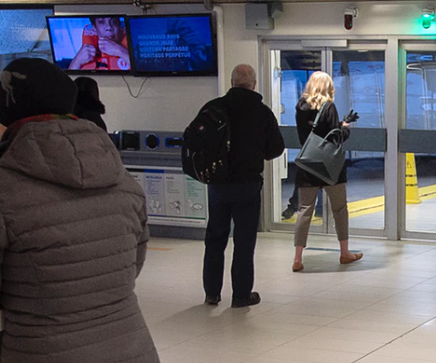Canadians are well known for their reserved politeness. If someone accidentally steps on our toe or bumps into us, we apologize: “Sorry.” We are also widely known as a compassionate people — we value personal autonomy, but also embrace collective responsibility. In times of trouble, we can usually be counted on to reach out in an effort to help others at home and around the world.

Memorial to the passengers and crew of Swissair Flight 111, which crashed off the coast of Nova Scotia in 1998. (Shutterstock)
I have vivid memories of this in relation to Swissair Flight 111 bound for Geneva that exploded in the Atlantic Ocean near Peggy’s Cove. Local fishermen set out in their boats to help survivors; sadly, there were none.
A few years later, on Sept. 11, 2001, there were the co-ordinated terrorist attacks on the twin towers in New York City. Forty aircraft carrying some 8,000 passengers were diverted to Halifax Stanfield International Airport. Another 38 aircraft carrying close to 6,600 passengers were diverted to Gander International airport (at that time, the total population of Gander was less than 10,000). Nova Scotians and Newfoundlanders welcomed strangers into their homes.
And when I think about natural disasters, I remember Hurricane Juan, a tropical cyclone that made landfall in Halifax in 2003. Neighbours were out and about checking on those who needed food, electricity, transportation and so on. Community outreach was immediate and personal, long before government and other supports were available.
In 2003, the city of Toronto confronted SARS, which has since become a reference point for our current challenge with COVID-19. Then, as now, front-line workers and others were ready at hand to provide help.
The challenge with an epidemic (SARS) or a pandemic (COVID-19) is how the average Canadian can be of assistance when it requires us not so much to extend a helping hand but to stay away.
Pandemic responses
The helping hand will no doubt prove necessary in the sharing of resources, which some people are being accused of having hoarded. I choose to believe that most Canadians with an abundance of food, toilet paper, hand wipes, sanitizer and so on will share what they have; only a few will see this as a unique opportunity to make money by reselling needed products at a premium price.
But more and different is needed.
Many of us believe epidemiologist Bruce Aylward, the Newfoundlander who is leading the World Health Organization’s (WHO) efforts against COVID-19, when he says:
An overview of Canadian epidemiologist Bruce Aylward, and his role in addressing the global pandemic.
It follows that an effective response to the COVID-19 threat depends upon access to robust, accurate data in support of evidence-informed public health decision-making.
The need for broad-based accessible public health information aimed at increasing public awareness and promoting appropriate mitigation strategies — strategies that require people to change their behaviours — cannot be overstated. Important among these strategies are proper hand washing and social distancing.
Extending pandemic responses
It has taken a while, but the federal, provincial and territorial governments are now providing clear, co-ordinated information consistent with WHO advice about washing hands with soap and water or hand sanitizer, covering nose and mouth when coughing or sneezing, avoiding contact with persons exhibiting flu-like symptoms and avoiding large gatherings.
In response, schools from kindergartens to universities are being closed temporarily. Several workplaces are authorizing employees to work from home. Conferences and large meetings are being rescheduled or moved online. Sporting events are being cancelled. Establishments that regularly welcome crowds, such as hotels, movie theatres and airports, are instituting additional cleaning standards. This is all good, but more is needed.
Specifically, we need to seriously address the issue of public transportation. This remains one of the most common places where Canadians congregate. This is a challenge as many people depend on this service to get to work, to get to the grocery store, to get to the hospital and other care facilities, and more.
Certainly the cancellation of non-essential events and travel will cut down on the need for public transportation. But more is needed. Here is a radical idea — what if almost everyone was given a two-week holiday with pay, with the costs evenly split between the employer and the government?
Increasing the effectiveness of social distancing in order to stop community spread of COVID-19 likely will require making travel to work non-essential travel. The only way to do this is to give ALL non-essential workers (not just the privileged few who can work from home without affecting productivity) two weeks paid leave for the purpose of voluntary self-quarantine.
The time is now for businesses and governments to step up and lend a helping hand by supporting Canadians in their efforts to stop the spread of COVID-19.
![]()
Françoise Baylis, Research Professor, Philosophy, Dalhousie University
This article is republished from The Conversation under a Creative Commons license. Read the original article.
"Voices of the RSC” is a series of written interventions from Members of the Royal Society of Canada. The articles provide timely looks at matters of importance to Canadians, expressed by the emerging generation of Canada’s academic leadership. Opinions presented are those of the author(s), and do not necessarily reflect the views of the Royal Society of Canada


